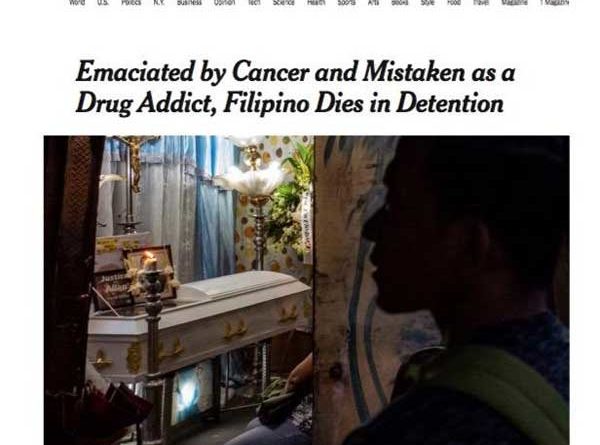OP ED COLUMN: OPINION ON PAGE ONE – Why does The New York Times hate Duterte?
NEXT to US President Trump who calls it a purveyor of fake news in America, our own President Duterte is inarguably The New York Times’ favorite whipping boy, its evil incarnate.
I wouldn’t have cared at all. However, despite its steep fall in credibility — and integrity — in the past decade, the NYT still has a considerable role in public opinion in the US and even worldwide. In the past year under Trump’s administration, it has all but shed its pretensions for objectivity, revealing itself as the spokesman for one faction of its ruling political elite, the Democratic Party.
Newspapers, even the biggest ones in developed countries, have withdrawn their once wide network of international correspondents, and just publish NYT articles on foreign countries, stupidly believing it still retains its journalistic competence and objectivity.
The NYT again recently demonstrated that it hasn’t let up on its campaign to vilify Duterte and the country when it had a front-page article on August 19 titled “Emaciated by Cancer and Mistaken as a Drug Addict, Filipino Dies in Detention.” The internet version even had two color photos of the funeral wake and a demonstration “against extrajudicial killings in the Philippines.”
The article, even just the title, is nothing but total media sensationalism, intended to tug at readers’ hearts to depict the Philippine government as a horrific, cruel regime killing even those dying of cancer.
When did the Filipino, a former OFW, die? August 9, or 10 days ago. Did the article report that the police claimed that the suspected drug-user was found to have two sachets of shabu? That not only the police but also the National Bureau of Investigation was undertaking its own investigation of the crime? No.
The article was clearly just another piece to bolster the NYT’s false picture of the Duterte administration as a bloody regime. Of course, it’s news, fitting only for domestic newspapers. But for the NYT to run it?
It has a purpose, which is to claim again as it has done many times already, as that article itself states in its fourth paragraph: “Mr. Duterte’s drug war has killed thousands of people, and most deaths go largely unnoticed.” It then quotes the chairman of “the group Migrante International,” which it didn’t mention is a front of the Communist Party: “Instead of punishing erring policemen, the Duterte regime just simply relocates these murderous brutes to other places, and worse, promotes some of them.”
Ten days after local newspapers had that news story, the NYT writer couldn’t even get the side of government and the police on the issue?
It is only the NYT among the thousands of newspapers abroad that published this piece of news. The NYT’s bias is obvious in that news on that drug suspect’s death while detained is really—if the claim that he wasn’t at all a drug addict nor pusher is true—a case of police brutality.
But how many cases of police brutality in the US and even in the world does the NYT ignore, especially as it’s not supposed to be a crime-and-sex tabloid like the New York Post or New York Daily News? How many of the 3,000 killed by American police from 2015 to 2017 (according to the monitoring of the Washington Post) has the NYT given such prominence as a news story.?
An article in the blog of The Lancet, the world’s most prestigious general-medicine journal, in fact claimed that police brutality has become a “global health problem,” and noted the following:
— “In 2016-17, people were killed by the police or the army for peacefully standing up for human rights in 22 countries;
— In 2017 in the US, the Washington Post reported that 748 people lost their lives at the hands of the police, 309 of them of African American ethnic background; the economic costs of police brutality estimated to be about £1.8 billion per year;
— South-Africa’s Independent Police Investigative Directorate in 2016 reported 366 civilian deaths as a result of police action, 216 in police custody, 145 cases of torture, and 31 cases of rape; and
— In the run-up to the 2016 Olympics, there were 920 killings by the police in Rio de Janeiro, Brazil— an increase of 103 percent from the previous year.”
The NYT hasn’t given the same kind of space it has been giving police brutality cases here compared to those elsewhere. In fact, cases of police brutality in the Philippines account for over 90 percent of articles in the NYT on our country. There’s been nothing in the NYT articles like an objective analysis of how successful the anti-drug war has been, how the crime rate has precipitously declined, how the economy has surged in the past two years, how a bold infrastructure program has been going on, how foreign investment has surged since Duterte assumed power in mid-2016.
I asked Secretary Martin Andanar, the head of Malacañang’s communication organization, why his office had not been rebutting the NYT’s very biased and even erroneous articles. He replied: “We’ve written dozens of letters to it. Not one has been published.”
A statement in that Lancet article, however, is another indication of the success of the NYT, our local Rappler, the Philippine Daily Inquirer, and the New York-based Human Rights Watch in spreading very false data on the country’s anti-drug war.
The article claimed: “In the Philippines, hundreds of children have been killed in 2016-2017, and over 200,000 civilians displaced as a result of the government’s ‘war on drugs’.” Even Sen. Antonio Trillanes 4th won’t make such patent lies.
I can think of several reasons why the NYT is on an all-out campaign to topple Duterte by portraying him as evil:
— A Filipino-American billionaire, a big supporter of the Yellow Cult based in New York has made it her mission in life to use the NYT to vilify Duterte. This can be done in so many ways, even simply through regular dinners with NYT editors and journalists in her huge posh Manhattan apartment, by which she regularly feeds false but horrific news about the country. An ardent supporter of the Clintons before, she has an extensive network in America’s newspaper elite.
— The NYT and the liberal establishment which it has been the spokesman of, had created the myth of the pro-US Aquinos as a godsend to the Philippines. Cory first and then her son Noynoy. Duterte is the antithesis, even the enemy of the Aquinos, whom therefore they have to topple.
— The NYT has been the mouthpiece of America’s liberal establishment which has proclaimed itself as the champion of democracy and human rights worldwide. With Duterte having been portrayed by the Yellows early in his administration as a strongman and a violator of human rights, the NYT has embraced this narrative, and has even vowed to develop it. Duterte’s distancing from the US to become closer to China has bolstered that notion. Having refused to be the US’ dummy in the South China Sea issue which is so crucial to American hegemony in Asia, it is not farfetched to think that America’s deep state has already given orders to its operative to take out Duterte.
— And lastly, we have this nauseating phenomenon of Filipinos delighting in putting the Philippines down, a not so surprising attitude in this country where nationalism has all but vanished. Case in point is this Felipe Villamor who wrote that recent article about that cancer-stricken drug suspect (and who has not written a single piece in the NYT reporting something good in the Duterte administration); one Miguel Syjuco who has lived all his life in the US, and who has contributed over a dozen opinion pieces to the NYT, all disparaging Duterte and the country; and even the local staff of wire agencies like Reuters, one of whom was even a co-awardee of the Pulitzer Prize because of his article that was based on a fraudulent study of Duterte’s anti-drug war.
“But it’s your own countrymen who have been writing all these scathing articles on Duterte and your country,” NYT editors would likely tell me, with a smirk on their faces.
How do I answer that?
Email: [email protected]
Facebook: Rigoberto Tiglao
Twitter: @bobitiglao
Archives at: www.rigobertotiglao.com
 All photographs, news, editorials, opinions, information, data, others have been taken from the Internet ..aseanews.net | [email protected] |.For comments, Email to :D’Equalizer | [email protected] | Contributor
All photographs, news, editorials, opinions, information, data, others have been taken from the Internet ..aseanews.net | [email protected] |.For comments, Email to :D’Equalizer | [email protected] | Contributor











